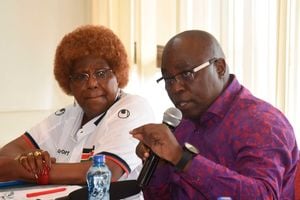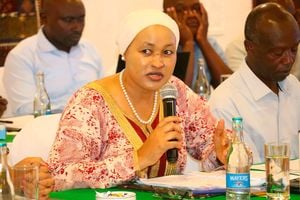
National Assembly Majority Leader Kimani Ichung’wah
The fear of triggering public anger by trying to amend the Constitution through the backdoor forced the government to withdraw the controversial Land Laws (Amendment) Bill 2023 that was already under consideration in the National Assembly.
At the time of the withdrawal, the Bill which sought to introduce an annual levy on freehold land, and also dilute the constitutional powers of the National Land Commission (NLC) by transferring its major functions to the Lands Cabinet Secretary, was before the House’s Lands Committee.
The Bill, sponsored by the Leader of Majority Kimani Ichung’wah, sought to amend six Land Acts — the Registration of Documents Act, Land Control Act, Land Registration Act, Land Act, Community Land Act and the Sectional Properties Act.
By virtue of his position, Mr Ichung’wah, who is the Kikuyu Member of Parliament, signs all government Bills introduced in the National Assembly.
Aware of the opposition and public disapproval the Bill had generated on June 13, Mr Ichung’wah formally conveyed the government's intentions by writing to the House Speaker Moses Wetang’ula expressing his desire to have the Bill withdrawn.
“Having consulted with the relevant stakeholders, this is now to confirm that the majority party has withdrawn the Bill,” said Mr Ichung’wah in the letter to the Speaker.
Consequently, Mr Ichung’wah went on to request that the House Business Committee that is chaired by the Speaker and has a duty to prioritise the business to be transacted by MPs in the House, to be notified of the withdrawal of the Bill and that “no further consideration of the Bill should be undertaken.”
The NLC is a constitutional commission mandated with spearheading land reforms in the country. Despite this, the Bill sought to transfer commission’s two major functions — land valuation and compulsory acquisition of land on behalf of the national and county governments — to the Lands Cabinet Secretary.
The Bill also sought to take away from NLC the mandate to inspect land and conduct investigations in determining requests for acquisition by public bodies, pay compensation to affected land owners, issue compensation awards and take part in the renewal of land leases and donate it to the Lands CS.
What annoyed Kenyans the most is the proposal to introduce rates on freehold land, a move that would have transferred ownership to the government and effectively subjecting them to lessors with the possibility of losing their parcels to the government in the event they failed to pay the accrued rates.
Most ancestral land in Kenya is freehold and is owned with no fees charged on it by the government, whether annual or periodical.
“The owner of any freehold land situated within the boundaries of any urban area or city shall pay an annual land levy equivalent to land rent charged on a comparable leasehold land or property of the same zone,” reads the proposed new clause 54A of the Bill.
It goes on to propose; “Provided that any owner of freehold land that is put to agricultural use may be exempt from the annual levy.”
This, notwithstanding the Supreme Court Advisory opinion of 2014 confirmed that the provisions of the Land Act were consistent with the Constitution on the NLC’s mandate to protect and oversee public interests.
When the NLC Chief Executive Officer Kabale Tache appeared before the National Assembly Lands Committee in February to give her views on the Bill, she opposed the imposition of annual levy on freehold land. She said it is akin to double taxation.
“There should be no levy charged on freehold land apart from the rates. Freehold interests are superior interests and there is no landlord and therefore no rent can be owed,” Ms Tache told the committee chaired by North Mugirango MP Joash Nyamoko.
She noted that the proposal infringes on the provisions of the Urban Cities Areas and Cities Act.
Further, the Bill proposed the establishment of the Land Compensation Inquiry Committee, effectively taking over the role of the commission by serving as the primary authority to determine compensation to be paid in cases of compulsory acquisition of land. The Bill also sought to amend the NLC Act to remove the time limits to review all grants and disposition of public land to allow continuous receipt of historical land injustices claims to be heard beyond 2026.
While withdrawing the Bill, Mr Ichung’wah said: “It is noteworthy that there are various ensuing constitutional and legal issues arising from the Bill.”
“In this regard, the Executive had further advised on the need for the ensuing issues to be addressed and resolved before further consideration of the Bill,” said the Kikuyu MP.
He said that during the meeting of the House Business Committee, he had informed the Lands Committee not to prioritise the consideration of the Bill to allow for consultations with the Ministry of Lands and Physical Planning and the NLC.
The withdrawal of a Bill is usually followed by a formal communication from the Speaker in line with House Standing Orders.
However, there is no record of Mr Wetang’ula’s communication.
Standing Order 140 of the National Assembly Standing Orders provide for the withdrawal of Bills introduced in the House but with the leave of the Speaker.
The House rules provide that the Member in charge of a Bill may, without notice, claim to withdraw a Bill either before the commencement of business or on the Order of the Day for any stage of the Bill being read.
“A Bill may only be withdrawn with the leave of the Speaker,” the House rules state adding; “If the Speaker is of the opinion that the claim is not an abuse of the proceedings of the House, the Speaker shall direct and the Bill shall be withdrawn.”
The withdrawal of a Bill is usually followed by a message from the Speaker formally communicating the withdrawal in line with the House Standing Orders.
However, there is no record showing that Speaker Wetang’ula communicated to the House of the Bill’s withdrawal despite Mr Ichung’wah’s withdrawal request.
An amendment to the Land Registration Act would have blocked the registration of any freehold land whose annual land rates have not been paid, making it difficult for buyers of such lands.







